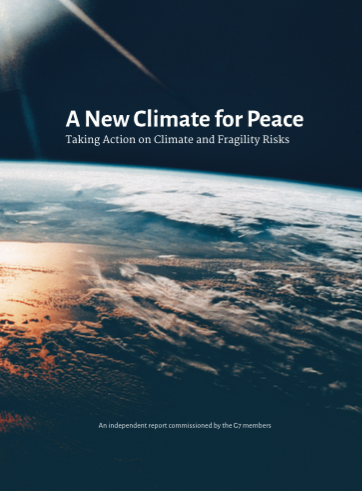An independent report titled ‘A New Climate for Peace: Taking Action on Climate and Fragility Risks,' commissioned by members of the Group of Seven (G7), has identified seven compound climate-fragility risks that pose serious threats to the stability of states and societies in the decades to come.
 25 June 2015: An independent report, titled ‘A New Climate for Peace: Taking Action on Climate and Fragility Risks,’ commissioned by members of the Group of Seven (G7), has identified seven compound climate-fragility risks that pose serious threats to the stability of States and societies in the decades to come.
25 June 2015: An independent report, titled ‘A New Climate for Peace: Taking Action on Climate and Fragility Risks,’ commissioned by members of the Group of Seven (G7), has identified seven compound climate-fragility risks that pose serious threats to the stability of States and societies in the decades to come.
Based on an assessment of existing policies on climate change adaptation, development cooperation and humanitarian aid, and peace building, the report recommends that the G7 take concrete action, both as individual members and jointly, to tackle those risks and increase the resilience of States and societies. Describing climate change as “the ultimate threat multiplier,” the report states that work to protect food security, reshape water sharing agreements and cut risks from worsening weather disasters could play a significant role in reducing future conflict and instability.
The report consists of four main sections. The introductory section describes the G7’s leadership on climate change and fragility, and outlines the report’s structure and methodology. The second section addresses the seven compound climate-fragility risks: local resource competition; livelihood insecurity and migration; extreme weather events and disasters; volatile food prices and provision; transboundary water management; sea-level rise and coastal degradation; and unintended effects of climate policies.
The third section conducts policy analysis, providing an integrated agenda for resilience with respect to climate change adaptation, development and humanitarian aid, and peacebuilding. The fourth section contains recommendations for a new commitment to resilience, including: making climate-fragility risks a central foreign policy priority; enhancing G7 cooperation; setting up a G7 task force informing global and multilateral processes and structures; and engaging a wide range of partners to ensure global actions produce local results. [Publication: A New Climate for Peace: Taking Action on Climate and Fragility Risks] [UNFCCC Press Release]